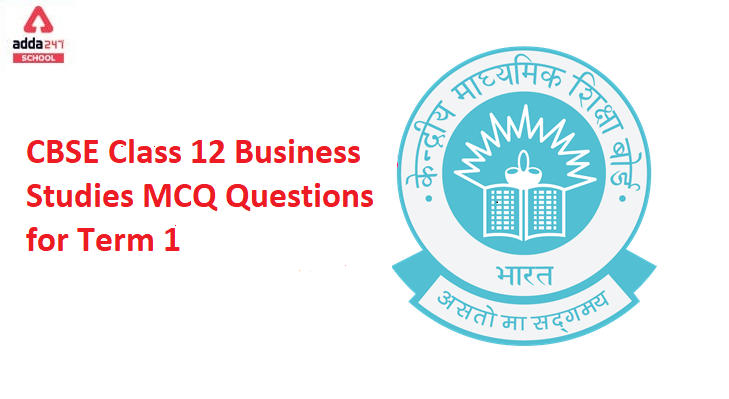Table of Contents
CBSE Class 12 Business Studies MCQ Term 1
CBSE Class 12 Business Studies MCQ Questions for Term 1: We’re all aware of the difficulties you’re having studying for CBSE Class 10 Term 1 Business Studies. It is extremely perplexing due to the shift in question structure. Students, on the other hand, need not be concerned about their CBSE Term 1 Business Studies paper; why? Because we’ve got your back! We’ve created some MCQs to assist you in studying for the CBSE Class 10 Term 1 Business Studies exam and coping with CBSE Class 10 Term 1 Business Studies. See CBSE Class 10 Term 1 Business Studies Important MCQ Questions With Answers for answers to the MCQs on this page. But first, best of luck with your CBSE Class 10 Term 1 Business Studies exam!
Check: Class 12 Business Studies Answer key Term 1 2021
Read: Class 12 Geography MCQ Term 1 2021
Check: CBSE Class 10 All Subject Answer keys
Ckeck: CBSE Class 12 All Subject Answer keys
Business Studies Class 12 MCQs for Term 1 Questions with Answer
Management is essential for organisations which are
(a) Non-profit organisations
(b) Service organisations
(c) Social organisations
(d) All of the above
Answer: (d) All of the above
A business has to offer wider choice in purchasing enhanced quality of goods and services in order to maintain an edge over its competitors. The implementation of the new economic policy with liberalisation, privatisation and globalisation has posed various challenges for the corporate sector. One of the important challenges is explained in the above lines. Identify it.
(a) Increasing competition
(b) More demanding customers
(c) Necessity for change
(d) Market orientation
Answer: (a) Increasing competition
This technique of scientific management aims to determine the amount and frequency of rest intervals that should be provided to the employees during working hours.
(a) Time study
(b) Method study
(c) Motion study
(d) None of the above
Answer: (d) None of the above
The Union Cabinet has given ‘in-principle’ nod to divest stakes in Air India — a wholly government owned airline. This means the government is willing to shed a substantial portion of its stake and hand over the management of the ailing airline to the private sector. Identify the concept being described in the above lines.
(a) Liberalisation
(b) Privatisation
(c) Globalisation
(d) Demonetisation
Answer: (b) Privatisation
In 2019 alone, Swiggy has launched operations in 300 towns and cities. Swiggy follows a two-step sequence while expanding to a small town. First, it provides more laborious training to restaurants and delivery partners compared to their counterparts in the city. Second, it focuses on building scale in operations and increase the restaurant’s reach to a larger base of consumers, including optimizing kitchens, resource planning among others. Identify the type of plan being described in the above lines.
(a) Method
(b) Strategy
(c) Programme
(d) Procedure
Answer: (b) Strategy
The principles of management are intended to be applied to all types and sizes of organisations. This statement reflects that the principles of management are
(a) General guidelines
(b) Flexible
(c) Universally applicable
(d) Mainly behavioural
Answer: (c) Universally applicable
The technique of differential piece rate system was developed by Taylor in order to
(a) Discriminate between efficient and inefficient workers
(b) Reward the efficient worker
(c) Motivate the inefficient workers to perform better
(d) All of the above
Answer: (d) All of the above
Which of the following is a feature of demonetisation?
(a) Tax administration measure
(b) Channelising savings into the formal financial system
(c) Development of less-cash economy
(d) All of the above
Answer: (d) All of the above
Which of the following statements does not pertain to middle-level management?
(a) They are responsible for all the activities of the operational managers.
(b) They are responsible for the welfare and survival of the organisation.
(c) They interpret the policies made by top-level managers
(d) Co-operate with other departments for the smooth running of the organisation.
Answer: (b) They are responsible for the welfare and survival of the organisation.
Which of the following is not a designation related to middle level management?
(a) Operations Head
(b) Sales Manager
(c) Chief Operating Officer
(d) Divisional Manager
Answer: (c) Chief Operating Officer
Which of the following is not a part of the business environment of business?
(a) Customers
(b) Suppliers
(c) Competitors
(d) None of the above
Answer: (d) None of the above
The application of this principle of management leads to higher production and better work for the same effort. Identify the related principle of general management.
(a) Discipline
(b) Equity
(c) Division of work
(d) Order
Answer: (c) Division of work
Name the type of budget which is prepared to determine the net cash position.
(a) Purchase budget
(b) Sales budget
(c) Cash budget
(d) Production budget
Answer: (c) Cash budget
Any kind of external devices, like compact discs (CD’s) for computer, have become obsolete. Google, with its Google Drive service, Apple with its iCloud offering, enables the users store documents, photos, music and movies on web-based servers. Identify the feature of business environment being described in the above lines.
(a) Relativity
(b) Dynamic nature
(c) Uncertainty
(d) Interrelatedness
Answer: (c) Uncertainty
Effectiveness relates to
(a) Doing the right task
(b) Completing activities
(c) Achieving goals
(d) All of the above
Answer: (d) All of the above
Deepak is striving to earn a profit of 30% in the current financial year. Identify the type of plan being described in the above lines.
(a) Method
(b) Objective
(c) Strategy
(d) Programme
Answer: (b) Objective
Name the principle of management suggested by Henri Fayol, which advocates that, “there should be good superiors at all levels, clear and fair agreement and judicious application of penalties.”
(a) Authority and responsibility
(b) Esprit De Corps
(c) Order
(d) None of the above
Answer: (d) None of the above
The principles of management have been developed on the basis of
(a) Observation
(b) Experimentation
(c) Personal experiences of the manager
(d) All of the above
Answer: (d) All of the above
Swatch Ltd. plans to earn a 20% return on its investment in a new project. Identify the type of plan being described in the above lines.
(a) Method
(b) Strategy
(c) Programme
(d) Objective
Answer: (d) Objective
Management contains a series of interrelated functions that include
(a) Planning
(b) Organising
(c) Directing
(d) All of the above
Answer: (d) All of the above
Which principle of general management advocates that, “Employee turnover should be minimised to maintain organisational efficiency.”?
(a) Stability of personnel
(b) Remuneration of employees
(c) Equity
(d) Esprit De Corps
Answer: (a) Stability of personnel
It is defined as the framework within which managerial and operating tasks are performed.
(a) Span of management
(b) Organisational structure
(c) Informal organisation
(d) None of the above
Answer: (b) Organisational structure
The main task of this level of management is to determine the overall organisational objectives and strategies for their realisation.
(a) Operational management
(b) Middle-level management
(c) First-line managers
(d) Top level management
Answer: (d) Top level management
Successful organisations do not achieve goals by chance but by following a deliberate process known as
(a) Planning
(b) Co-ordination
(c) Controlling
(d) Management
Answer: (d) Management
People in the organisations carry out diverse tasks with the aim to achieve
(a) Different objectives
(b) Common objectives
(c) Both of the above
(d) None of the above
Answer: (b) Common objectives
It refers to the number of subordinates that can be effectively managed by a superior,
(a) Organisational structure
(b) Informal organisation
(c) Span of management
(d) None of the above
Answer: (c) Span of management
The principles of management do not provide readymade straight jacket solutions to all management problems because
(a) The real business situations are complex.
(b) The real business situations are dynamic.
(c) The principles act as general guidelines.
(d) All of the above.
Answer: (d) All of the above.
It is very difficult to detect the source of such communication.
(a) Upward communication
(b) Vertical communication
(c) Lateral communication
(d) Informal communication
Answer: (d) Informal communication
Organising as a function of management involves deciding
(a) What activities and resources are required
(b) Who will do a particular task
(c) Where will it be done
(d) All of the above
Answer: (d) All of the above
Successful management ensures that
(a) Goals are achieved with the least cost
(b) Timely achievement of goals
(c) Both of the above
(d) None of the above
Answer: (c) Both of the above
The authority-responsibility relationships that exist within the organisation give rise to
(a) Different functions within the organisation
(b) Different levels in the organisation
(c) Management as a multidimensional activity
(d) Management as a group activity
Answer: (b) Different levels in the organisation
Which of the following is not important for controlling function?
(a) It ensures order and discipline.
(b) It restricts coordination in action.
(c) It helps in judging the accuracy of standards.
(d) It improves employee motivation.
Answer: (b) It restricts coordination in action.
The size of assets, profitability and competitiveness are all affected by
(a) Working capital decision
(b) Capital budgeting decision
(c) Financing decision
(d) Dividend decision
Answer: (b) Capital budgeting decision
The inability of a business to meet its fixed financial obligations, like payment of interest, is known as
(a) Business risk
(b) Financial risk
(c) Long-term risk
(d) Market risk
Answer: (b) Financial risk
| Class 12 Maths MCQs | Class 12 Physical Education MCQs |
| Class 12 Chemistry MCQs | Class 12 English MCQs |
| Class 12 Economics MCQs | Class 12 Sociology MCQ |
FAQs on CBSE Class 12 Business Studies MCQ Questions for Term 1
Q. From where we get CBSE Class 12 Business Studies MCQ Questions for Term 1 Sample Papers?
Ans. Please Check Adda247 school Website for All Subject sample paper.


 CBSE Class 12 Result 2024 to be Released...
CBSE Class 12 Result 2024 to be Released...
 CBSE Class 10 Result 2024 To Be Declared...
CBSE Class 10 Result 2024 To Be Declared...
 KVS Lottery Result 2024 25, Kendriya Vid...
KVS Lottery Result 2024 25, Kendriya Vid...














